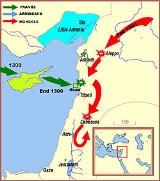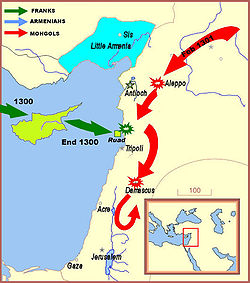
Kutlushah
Encyclopedia
Kutlushah, Kutluka (Mongol: Qutlugh-Shah, or Cotlesse in Frank
sources), was a general under the Mongol Ilkhanate
ruler Ghazan at the end the 13th century. He was particularly active in the Christian country of Georgia
and especially during the Mongol invasion of Syria, until his ignominious defeat in 1303 led to his banishment.
, where he owned lands, and his family was well known. He was often used as an intermediary and embassador to negotiate with king David VIII
who consistently opposed Mongol rule.
When David VIII required reassurances from the Mongols, in the shape of promisses and hostages, Kutlushah provided his own sons together with the sons of other Mongol princes, and brought the Ghazan's ring. These reassurances help establish more confident relations between the Georgians and the Mongols, as the Georgians were key in maintaining the northern defenses of the Il-Khan realm against the Golden Horde
.
In 1298 and 1300, Kutlushah led the repression against popular revolts in the lands of David VIII.
 In 1300 Ghazan had promised a major invasion of Syria. However, he ended up sending a smaller force In February 1301, under Kutlushah. The force of approximately 60,000, did little else than engage in some raids around Syria. Kutlushah stationed 20,000 horsemen in the Jordan valley
In 1300 Ghazan had promised a major invasion of Syria. However, he ended up sending a smaller force In February 1301, under Kutlushah. The force of approximately 60,000, did little else than engage in some raids around Syria. Kutlushah stationed 20,000 horsemen in the Jordan valley
to protect Damas, where a Mongol governor was stationed. Soon however, they had to withdraw. According to the medieval historian Templar of Tyre
:
 Kutlushah also led the 1303 Mongol offensive into Syria
Kutlushah also led the 1303 Mongol offensive into Syria
, with a strong force of about 80,000, plus troops from the Armenians. However Kutlushah, along with another Mongol general Mulay
, were defeated with the Armenians at Homs on March 30, 1303, and at the decisive Battle of Shaqhab, south of Damas, on April 21, 1303. Their invasion, decisively repelled by the Egyptian Mamluk
s, is considered to be the last major Mongol invasion of Syria.
, Kutlushah barely escaped the death penalty for his defeat. Instead, he received the humiliation of being spit upon by all the people present at his judgement, and his generals all received baton strokes as a punishment. Kutlushah was then exiled to the region of Gilan. During the reign of Oljeitu, he was killed in 1307 while leading army into Gilan where the inhabitants ignored the Ilkhan's demand for submission.
Frank
Frank may refer to:* A member of the medieval Germanic people, the Franks* Frank * Frank * Crusaders or any persons originating in Catholic western Europe, in medieval Middle Eastern history...
sources), was a general under the Mongol Ilkhanate
Ilkhanate
The Ilkhanate, also spelled Il-khanate , was a Mongol khanate established in Azerbaijan and Persia in the 13th century, considered a part of the Mongol Empire...
ruler Ghazan at the end the 13th century. He was particularly active in the Christian country of Georgia
Georgia (country)
Georgia is a sovereign state in the Caucasus region of Eurasia. Located at the crossroads of Western Asia and Eastern Europe, it is bounded to the west by the Black Sea, to the north by Russia, to the southwest by Turkey, to the south by Armenia, and to the southeast by Azerbaijan. The capital of...
and especially during the Mongol invasion of Syria, until his ignominious defeat in 1303 led to his banishment.
Georgian campaigns
Kutlushah had an important role in the Kingdom of GeorgiaKingdom of Georgia
The Kingdom of Georgia was a medieval monarchy established in AD 978 by Bagrat III.It flourished during the 11th and 12th centuries, the so-called "golden age" of the history of Georgia. It fell to the Mongol invasions of the 13th century, but managed to re-assert sovereignty by 1327...
, where he owned lands, and his family was well known. He was often used as an intermediary and embassador to negotiate with king David VIII
David VIII of Georgia
David VIII , from the Bagrationi dynasty, was king of Georgia in 1293–1311.Eldest son of Demetre II the Self-sacrificing, he was appointed by the Ilkhan ruler Gaikhatu as king of Georgia as reward for his military service during the Rümelian uprising in 1293...
who consistently opposed Mongol rule.
When David VIII required reassurances from the Mongols, in the shape of promisses and hostages, Kutlushah provided his own sons together with the sons of other Mongol princes, and brought the Ghazan's ring. These reassurances help establish more confident relations between the Georgians and the Mongols, as the Georgians were key in maintaining the northern defenses of the Il-Khan realm against the Golden Horde
Golden Horde
The Golden Horde was a Mongol and later Turkicized khanate that formed the north-western sector of the Mongol Empire...
.
In 1298 and 1300, Kutlushah led the repression against popular revolts in the lands of David VIII.
1301 offensive

Jordan Valley (Middle East)
The Jordan Valley forms part of the larger Jordan Rift Valley. It is 120 kilometers long and 15 kilometers wide, where it runs from Lake Tiberias in the north to northern Dead Sea in the south. It runs for an additional 155 kilometer south of the Dead Sea to Aqaba, an area also known as Wadi...
to protect Damas, where a Mongol governor was stationed. Soon however, they had to withdraw. According to the medieval historian Templar of Tyre
Templar of Tyre
The Templar of Tyre is the name of a medieval historian and also of the document he wrote in the 14th century, the third and largest section of the Gestes des Chiprois...
:
1303 offensive

Syria
Syria , officially the Syrian Arab Republic , is a country in Western Asia, bordering Lebanon and the Mediterranean Sea to the West, Turkey to the north, Iraq to the east, Jordan to the south, and Israel to the southwest....
, with a strong force of about 80,000, plus troops from the Armenians. However Kutlushah, along with another Mongol general Mulay
Mulay
Mulay, Mûlay, Bulay, or Molay for the Franks, was a general under the Mongol Ilkhanate ruler Ghazan at the end the 13th century. Mulay was part of the 1299–1300 Mongol offensive in Syria and Palestine, and remained with a small force to occupy the land after the departure of Ghazan. He also...
, were defeated with the Armenians at Homs on March 30, 1303, and at the decisive Battle of Shaqhab, south of Damas, on April 21, 1303. Their invasion, decisively repelled by the Egyptian Mamluk
Mamluk
A Mamluk was a soldier of slave origin, who were predominantly Cumans/Kipchaks The "mamluk phenomenon", as David Ayalon dubbed the creation of the specific warrior...
s, is considered to be the last major Mongol invasion of Syria.
Later life
According to the Mamluk historian Al-MaqriziAl-Maqrizi
Taqi al-Din Ahmad ibn 'Ali ibn 'Abd al-Qadir ibn Muhammad al-Maqrizi ; Arabic: , was an Egyptian historian more commonly known as al-Maqrizi or Makrizi...
, Kutlushah barely escaped the death penalty for his defeat. Instead, he received the humiliation of being spit upon by all the people present at his judgement, and his generals all received baton strokes as a punishment. Kutlushah was then exiled to the region of Gilan. During the reign of Oljeitu, he was killed in 1307 while leading army into Gilan where the inhabitants ignored the Ilkhan's demand for submission.

